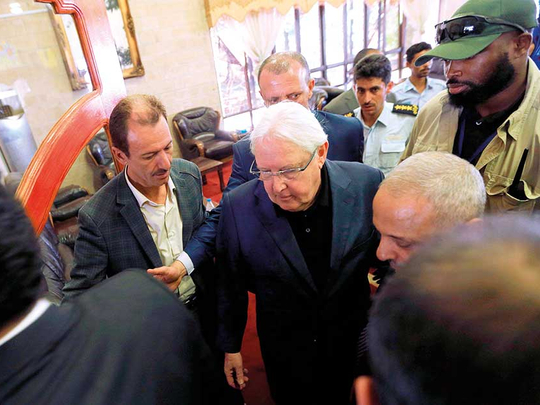
Cairo: The Arab coalition fighting Iran-allied Al Houthis in Yemen is committed to a UN-led peace process but pressure on the extremists is necessary, said Lana Zaki Nusseibeh, the UAE permanent representative to the UN.
In 2015, the coalition led by Saudi Arabia and the UAE intervened in Yemen at the request of the government against Al Houthis after the militants advanced on the southern city of Aden, the temporary capital of the country after their takeover of the capital Sana’a.
“The coalition is ready to support new talks whenever the [UN] special envoy can ensure Al Houthis’ meaningful participation,” Nusseibeh said in a letter to President of the UN Security Council Nikki Haley.
Last week, Al Houthis dealt a harsh blow to UN envoy Martin Griffiths’ efforts to revive Yemen’s long-stalled peace process by failing to appear in Geneva for scheduled indirect talks.
Griffiths on Sunday arrived in Al Houthi-controlled Sana’a in a fresh attempt to arrange a new round of talks.
Yemeni forces, supported by the coalition, have since stepped up the military campaign aimed at liberating the western city of Hodeida and its crucial port from Al Houthis.
“What is now clear is that any potential progress at the negotiating table depends on sustaining pressure on Al Houthis,” Nusseibeh said in the letter which was also sent to UN chief Antonio Guterres.
“While military action should be the last resort in the coalition’s view, the liberation of Hodeida is critical to re-engaging Al Houthis in peace talks. To that end, Yemeni government forces backed by the coalition have now intensified military operations against Al Houthis in the Hodeida area and on other fronts.”
She also urged the Security Council and international community to put pressure on Al Houthis. “This should begin with immediate action to sever Al Houthis’ supply of weapons, funding, and technical assistance from Iran, which is in direct violation of Security Council resolutions 2216 and 2231,” Nusseibeh said, according to the official news agency WAM.
In recent months, Al Houthis have stepped up their missile attacks across the border into Saudi Arabia.
The Saudi air defences late on Saturday intercepted a ballistic missile launched by the rebels from their stronghold of Sa’ada towards the south-western Saudi region of Jizan, the coalition spokesman Colonel Turki Al Malaki said.
He estimated that Al Houthis have fired a total of 196 missiles towards Saudi Arabia, resulting in 112 civilian deaths, since the Iran-supported extremists’ coup against the Yemeni government in late 2014.
The Saudi-led coalition accuses Al Houthis of taking advantage of their control of Hodeida port to obtain weapons from their Iranian patrons as well as confiscate aid intended for Yemenis in order to sustain their war effort.
In June, the government forces, backed by the coalition air power, started a major offensive to expel Al Houthis from Hodeida.
The campaign was temporarily halted in support of Griffiths’ efforts.
Government forces this week recaptured the strategically important district of Kilo 16 east of Hodeida.
The army troops have taken control of all areas in the vicinity of Kilo 16 and are now besieging the rebels, a military commander said on Sunday.
“This has allowed the troops to besiege the militias inside Hodeida from three directions. The militias have now only one entrance to the city,” Col Ahmad Al Subehi of the pro-government Giants Brigades, said.
Fierce clashes were, meanwhile, raging between government forces and the rebels on the outskirts of Hodeida as the Yemeni army is seeking to tighten a blockade on Al Houthis inside Hodeida in order to force them to surrender, military sources told Al Arabiya.












